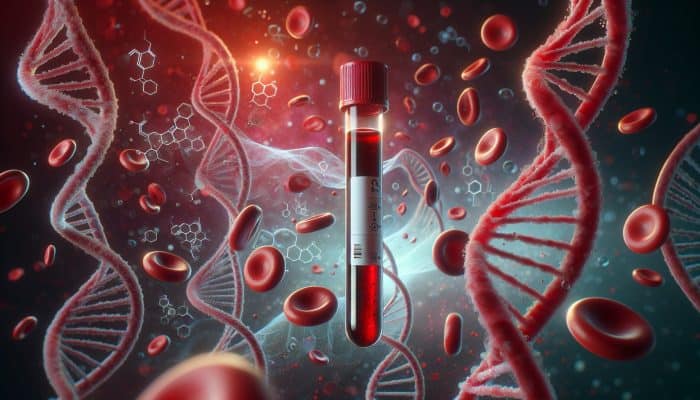Uncover the Essential Importance of a Vitamin B12 Blood Test for Your Well-Being
Key Reasons to Assess Your Vitamin B12 Levels

A vitamin B12 blood test serves as an indispensable diagnostic procedure that evaluates the levels of vitamin B12 present in your bloodstream, offering invaluable insights into your overall health and well-being. This test is crucial for identifying deficiencies that could lead to severe health complications such as <a href=”https://bloodtest.co.uk/anaemia-home-test-your-guide-to-at-home-testing/”>anaemia</a> and a range of neurological disorders. Vitamin B12 plays a pivotal role in the formation of red blood cells, proper functioning of the nervous system, and the synthesis of DNA. Inadequate levels of this vital vitamin can result in debilitating symptoms, including fatigue, weakness, and various neurological issues, which can significantly hinder your daily activities and overall health. By undergoing this test, you can determine whether your vitamin B12 levels are sufficient, enabling timely interventions should any deficiencies be detected.
Gaining an understanding of the significance of the vitamin B12 blood test can lead to improved health outcomes. Timely testing can avert the worsening of deficiency-related symptoms, ensuring individuals maintain their vitality and health. Early detection of low vitamin B12 levels is essential as it allows for immediate corrective measures before the deficiency escalates into more severe health complications. By being proactive regarding your health, you can profoundly enhance your quality of life and well-being.
Identifying Individuals Who Should Undergo Vitamin B12 Deficiency Testing
Individuals experiencing symptoms such as fatigue, weakness, or memory loss should consider scheduling a vitamin B12 blood test without delay. These symptoms often act as warning signals of a possible deficiency and can easily be overlooked in the hustle and bustle of daily life. Furthermore, those adhering to specific dietary restrictions, particularly vegans and vegetarians, or individuals following limited diets may not be receiving adequate vitamin B12 from their nutritional sources. Medical conditions that impair nutrient absorption, such as pernicious anaemia or gastrointestinal disorders like Crohn’s disease, also warrant vitamin B12 testing to ensure optimal health and nutritional status.
Additionally, older adults face a heightened risk for vitamin B12 deficiency due to a decline in absorption efficiency that occurs with age. Regular screenings within this demographic are vital for the early detection of potential deficiencies. Pregnant and breastfeeding women should also consider testing, as maintaining sufficient vitamin B12 levels is crucial for the health of both the mother and the developing child. In summary, anyone who belongs to at-risk groups or exhibits relevant symptoms should consult their healthcare provider regarding the necessity of undergoing testing.
Understanding the Procedure for the Vitamin B12 Blood Test
The vitamin B12 blood test is a straightforward procedure that involves the collection of a small blood sample from a vein, typically located in the arm. A qualified healthcare professional will first disinfect the area with an antiseptic solution and then use a small needle to draw the blood sample. This process is swift and generally takes only a few minutes. Although patients may experience minor discomfort during the needle insertion, the procedure is typically well tolerated and does not require any anaesthesia.
Once the sample is collected, it is dispatched to a laboratory for analysis, where the blood is examined for its vitamin B12 levels. Results are usually available within a few days, depending on the laboratory's workload. This quick turnaround allows for timely diagnosis and necessary interventions, making it an effective tool for managing health. Patients can expect clear guidance from their healthcare provider regarding any preparations needed for the test, ensuring a smooth and efficient testing experience.
How to Accurately Interpret Your Vitamin B12 Test Results

Vitamin B12 test results are quantified in picograms per millilitre (pg/mL), with normal levels typically ranging from 200 to 900 pg/mL. If a patient's results fall below this range, it may indicate a deficiency that necessitates further investigation or treatment. For example, levels below 200 pg/mL often denote a significant deficiency that could lead to anaemia and neurological complications if not addressed swiftly.
Healthcare providers will interpret these results while considering the patient's individual symptoms and medical history. In instances where levels are borderline or if symptoms persist despite normal readings, additional testing may be warranted. It is crucial for patients to engage in discussions with their healthcare provider regarding their results to gain a comprehensive understanding of what the findings signify and what subsequent actions may be required. This dialogue can result in personalised treatment plans that may include dietary modifications, supplements, or vitamin B12 injections tailored to each individual's specific health needs.
Understanding the Benefits of Vitamin B12 Testing for Weymouth Residents
Timely Detection of Vitamin B12 Deficiency
The importance of early identification through a vitamin B12 blood test cannot be overstated. Detecting a deficiency promptly can prevent severe health conditions, including anaemia and irreversible nerve damage. In Weymouth, where dietary habits can vary greatly, timely testing empowers residents to maintain optimal health. Those who are informed about their vitamin B12 status are better equipped to make educated dietary choices and seek appropriate treatments.
By identifying deficiencies early, healthcare providers can offer timely and tailored interventions that significantly enhance a patient's quality of life. For instance, individuals who commence treatment as soon as symptoms emerge often experience quicker recovery and improved overall health outcomes. Residents of Weymouth who prioritise their health through regular vitamin B12 testing are likely to enjoy a more vibrant and active lifestyle.
Tailored Treatment Plans for Improved Health Outcomes

Results from vitamin B12 testing enable healthcare providers in Weymouth to formulate customised treatment plans tailored to the unique needs of each patient. Once a deficiency is confirmed, healthcare providers can recommend dietary modifications that incorporate more B12-rich foods, such as eggs, dairy products, meat, and fortified cereals. In cases of severe deficiency, they may suggest vitamin B12 injections or high-dose oral supplements to rapidly restore levels.
This personalised approach is particularly advantageous, as it considers the individual’s lifestyle, dietary preferences, and medical history. For instance, a vegan patient may require a different management strategy compared to someone who regularly consumes animal products. By addressing the unique needs of each individual, healthcare providers can enhance treatment adherence and improve health outcomes for patients in Weymouth.
Ongoing Health Monitoring and Progress Evaluation
Regular testing is essential for monitoring health progress, especially after initiating treatment for vitamin B12 deficiency. Once patients begin supplementation or dietary changes, follow-up tests help evaluate the effectiveness of the intervention and ensure that levels remain within a healthy range. This continuous assessment is crucial for adjusting treatment plans as needed and for identifying potential complications early on.
Residents in Weymouth gain significantly from a proactive approach to monitoring their vitamin B12 levels. By scheduling regular check-ups, individuals can uphold optimal health, minimise the risk of complications, and sustain energy levels. Moreover, healthcare providers can identify any emerging issues or additional deficiencies that may require attention, thereby supporting overall wellness and longevity.
Where to Access a Vitamin B12 Blood Test in Weymouth
Local General Practitioner Offices for Convenient Testing
Residents of Weymouth can easily obtain vitamin B12 blood tests at numerous general practitioner (GP) offices. Many local GP practices offer these tests as part of routine health assessments or upon patient request when they exhibit concerning symptoms. It is advisable for individuals to contact their local GP office directly to inquire about the availability of the test and the procedures for scheduling appointments.
Local GP offices provide a familiar environment where patients can discuss their symptoms and health concerns openly. The convenience of obtaining testing through their GP also facilitates seamless follow-up consultations, wherein results can be reviewed and treatment plans can be established. This familiarity significantly enhances patient comfort and trust in the healthcare system, ultimately leading to improved health outcomes.
Private Healthcare Clinics Offering Flexible Testing Options
In addition to GP offices, private healthcare clinics in Weymouth provide vitamin B12 testing services. These clinics often offer more flexible scheduling options and quicker turnaround times for results. Individuals seeking prompt testing without the potential waiting times associated with NHS services may find private clinics to be an appealing alternative.
Private clinics also deliver a more personalised service, often with additional resources and support for patients requiring further assistance. Healthcare professionals in these settings may provide tailored advice and treatment options based on the results, facilitating a more comprehensive approach to patient care. Residents looking to prioritise their health can easily locate nearby private clinics offering vitamin B12 blood tests.
Hospital Laboratories for Comprehensive Testing Services
Hospital laboratories in Weymouth are equipped to perform vitamin B12 blood tests, usually through referrals from healthcare providers. Patients may be referred to these facilities if their GP identifies a need for further investigation into their vitamin B12 status. Hospital laboratories are generally well-equipped and can provide accurate, reliable test results.
Obtaining vitamin B12 testing through hospitals often involves a referral process, which can ensure a more comprehensive evaluation of the patient’s overall health. This pathway is especially beneficial for individuals with complex medical histories or those requiring additional testing. Patients should consult with their healthcare provider regarding the most suitable route for testing based on their specific circumstances.
Expert Insights on the Importance of Vitamin B12 Blood Testing in Weymouth
The Necessity of Routine Testing for Optimal Health Maintenance
Regular vitamin B12 testing is essential for maintaining optimal health, particularly for at-risk groups in Weymouth. Individuals with dietary restrictions, older adults, and those with specific medical conditions are encouraged to incorporate routine testing into their healthcare regimen. Real-life examples illustrate how proactive testing has led to early interventions for patients, preventing serious health complications.
For instance, a local patient who faced fatigue and cognitive difficulties underwent a vitamin B12 test, which revealed significantly low levels. Following treatment, the individual reported a remarkable enhancement in energy levels and cognitive clarity. Such cases underscore the critical importance of routine testing and monitoring, which can lead to healthier outcomes and an improved quality of life.
What to Expect During the Vitamin B12 Blood Test Procedure
Understanding what to expect during a vitamin B12 blood test can help alleviate any anxiety associated with the procedure. Patients should anticipate a brief visit to a healthcare facility where a professional will clarify the process. It is essential to ensure that any necessary preparations, such as fasting, are adhered to before the test.
During the test, the healthcare provider will clean the skin area and insert a needle to draw a blood sample. Patients may feel a brief prick, but the procedure is generally quick, often completed within minutes. Afterward, patients might be asked to remain briefly to monitor for any potential post-draw reactions. Once the test is concluded, individuals can resume their normal activities while awaiting results to discuss with their healthcare provider.
How to Effectively Interpret Your Vitamin B12 Test Results
Understanding vitamin B12 test results is a vital aspect of patient care. Grasping what different levels signify can empower individuals to take control of their health. Normal levels typically range between 200-900 pg/mL, but results should be interpreted in the context of individual health and specific symptoms.
Healthcare providers can offer expert analysis of results, clarifying the implications of any deficiencies or borderline levels. For patients in Weymouth, knowing how to interpret results can facilitate proactive health management. It is essential for individuals to engage in discussions with their healthcare provider regarding their results, ensuring a comprehensive understanding of their health status and the necessary next steps for treatment or further evaluation.
Optimal Frequency for Vitamin B12 Testing: Essential Information
Recommended Testing Frequency for the General Population
For most individuals, vitamin B12 testing may be recommended every few years, especially if they are not exhibiting symptoms or do not belong to high-risk groups. However, certain factors can influence how often one should be tested, including:
- Presence of symptoms associated with vitamin B12 deficiency
- Dietary restrictions (e.g., vegan or vegetarian diets)
- Age, particularly for individuals over 60
- History of gastrointestinal disorders that affect absorption
- Family history of vitamin B12 deficiency
- Certain medications that may impact vitamin B12 levels
Being aware of these factors can assist individuals in making informed decisions regarding the frequency of testing. Regular evaluations not only facilitate early detection but also promote a proactive approach to health management, ultimately enhancing overall wellness.
Increased Testing Recommendations for At-Risk Groups
Individuals belonging to at-risk groups may require more frequent testing to closely monitor their vitamin B12 levels. Those with dietary restrictions, such as vegetarians and vegans, often struggle to obtain sufficient B12 from their diets alone. Consequently, regular testing can help identify deficiencies before they develop into serious health issues.
Furthermore, individuals with medical conditions affecting absorption should be vigilant regarding their vitamin B12 status. This includes patients with conditions like pernicious anaemia or gastrointestinal disorders. For these individuals, healthcare providers may recommend annual testing or more frequent evaluations based on their specific circumstances, ensuring timely intervention and effective management.
When to Retest After Starting Treatment for Deficiency
After commencing treatment for a vitamin B12 deficiency, it is generally advisable to retest levels within a few months to evaluate the effectiveness of the intervention. This follow-up is crucial for confirming that levels are returning to normal and for determining if adjustments to the treatment plan are necessary.
Healthcare providers will consider the individual’s response to treatment and any ongoing symptoms. For instance, if a patient has received vitamin B12 injections, they may be advised to undergo follow-up testing at specified intervals to ensure sustained improvement. Regular retesting not only aids in monitoring progress but also empowers individuals to actively engage in their health management.
Recognising Symptoms of Vitamin B12 Deficiency
Identifying Physical Symptoms of Deficiency
Physical signs of vitamin B12 deficiency can be quite varied, making awareness essential. Common indicators include fatigue, pale skin, heart palpitations, and loss of appetite. Given that vitamin B12 is crucial for energy production and red blood cell formation, deficiencies can lead to debilitating fatigue and weakness.
Early detection through testing is paramount, as untreated deficiencies may lead to exacerbated symptoms and more severe health complications. Individuals experiencing these symptoms are encouraged to seek prompt medical evaluation, as timely intervention can greatly enhance their quality of life. Regular monitoring and proactive health management can prevent these physical symptoms from worsening and support overall health.
Understanding Neurological Symptoms Associated with Deficiency
Neurological effects of low vitamin B12 levels can be particularly distressing, manifesting as numbness, tingling in the hands and feet, difficulty walking, and memory problems. These symptoms arise due to the vitamin’s critical role in neurological function and the maintenance of the myelin sheath that protects nerve fibres.
In Weymouth, awareness of these symptoms can lead to earlier diagnosis and intervention. Patients experiencing neurological symptoms should promptly consult their healthcare provider, as timely treatment can significantly decrease the risk of permanent nerve damage. Regular vitamin B12 testing becomes essential for those at risk, providing an opportunity for early detection and management of these concerning neurological manifestations.
Psychological Symptoms Linked to Vitamin B12 Deficiency
Psychological symptoms associated with vitamin B12 deficiency can be profound, including depression, anxiety, and confusion. The connection between vitamin B12 levels and mental health is well-documented, underscoring the necessity for individuals to monitor their status closely. In Weymouth, those experiencing psychological distress may benefit from a vitamin B12 blood test to rule out deficiency as a contributing factor.
The impact of these psychological symptoms can be significant, influencing personal relationships, work performance, and overall well-being. Recognising the potential connection between B12 deficiency and mental health issues highlights the importance of regular testing and proactive management of nutrient levels. Early intervention and treatment can lead to improved mental health outcomes and a higher overall quality of life.
Gastrointestinal Symptoms to Monitor
Gastrointestinal symptoms such as diarrhoea, constipation, and nausea can also indicate vitamin B12 deficiency. These digestive issues may arise from the vitamin’s role in maintaining a healthy gut environment. Acknowledging the link between gastrointestinal health and vitamin B12 levels is particularly important for residents of Weymouth who may experience these symptoms.
Timely medical evaluation is crucial for individuals reporting gastrointestinal concerns, as these symptoms can significantly disrupt daily life. Testing for vitamin B12 deficiency can facilitate appropriate interventions, ensuring that underlying issues are addressed before they escalate. Proactive management of gastrointestinal symptoms through regular testing can enhance overall digestive health and well-being.
Preparing for Your Vitamin B12 Blood Test: Essential Guidelines
Understanding Fasting Requirements Prior to Testing
Preparation for a vitamin B12 blood test may involve specific fasting requirements, although these can vary based on the healthcare provider’s instructions. Some healthcare professionals recommend fasting for several hours before the test to yield the most accurate results. It is crucial for patients to confirm specific fasting instructions with their provider ahead of the test.
Fasting helps reduce variables that could affect the results, ensuring a clearer assessment of vitamin B12 levels in the bloodstream. Patients should be informed about what to expect and plan accordingly, ensuring they do not consume food or drinks other than water during the fasting period. Proper preparation aids in facilitating a smooth testing process and enhances the reliability of outcomes.
Considering the Impact of Medications and Supplements
Certain medications and supplements can influence vitamin B12 levels, making it imperative for patients to inform their healthcare provider about any they are currently taking. Medications such as proton pump inhibitors, metformin, and specific antibiotics can affect B12 absorption, potentially leading to misleading test results.
Before the test, patients should compile a comprehensive list of all current medications and supplements, including over-the-counter products. This information enables healthcare providers to interpret results more accurately and make informed recommendations regarding potential adjustments to treatment or supplementation. Transparency about medication use fosters a more effective healthcare experience and ensures better management of vitamin B12 status.
Essential Information to Bring to Your Appointment
When preparing for a vitamin B12 blood test, it is advisable to bring relevant medical history to your appointment. This includes a list of current medications, any previous vitamin B12 test results, and information regarding any symptoms experienced. Having this information readily available allows the healthcare provider to conduct a thorough assessment and develop a comprehensive understanding of the patient’s health status.
Additionally, patients should consider bringing any questions or concerns they may have regarding the test or their health. Open communication with healthcare providers enhances the patient experience, ensuring that all aspects of care are addressed. Being well-prepared for the appointment can lead to improved outcomes and a more effective approach to health management.
Research-Backed Benefits of Vitamin B12 Blood Testing in Weymouth
Preventing Long-Term Health Complications through Early Detection
Regular vitamin B12 testing can effectively prevent long-term health issues such as permanent nerve damage and severe anaemia. Research has shown that early detection of vitamin B12 deficiency leads to more effective treatment and improved health outcomes. For residents of Weymouth, being aware of the potential consequences of untreated deficiencies underscores the necessity of routine testing.
Expert analysis suggests that proactive management of vitamin B12 levels not only addresses immediate health concerns but also contributes to long-term wellness. Individuals who prioritise regular testing are more likely to maintain optimal nutrient levels, thereby reducing the risk of complications associated with deficiencies. Residents can significantly benefit from incorporating regular vitamin B12 evaluations into their health routines.
Enhancing Cognitive Function with Consistent Testing
Adequate vitamin B12 levels are closely linked to enhanced cognitive function. Research indicates that maintaining optimal levels may contribute to improved memory, focus, and overall brain health. In Weymouth, where cognitive health is a growing concern among the ageing population, regular testing can help individuals remain informed about their vitamin B12 status.
Real-world examples illustrate the positive impact of testing and treatment on cognitive health. Patients who have successfully addressed deficiencies frequently report enhanced cognitive clarity and reduced symptoms of memory loss. By prioritising vitamin B12 testing, residents can take proactive measures to support their cognitive function and overall mental well-being.
Supporting Overall Health and Well-Being through Regular Testing
Maintaining optimal vitamin B12 levels through regular testing is crucial for supporting overall health, energy levels, and quality of life. When individuals are aware of their vitamin B12 status, they are better positioned to make informed health decisions, including dietary adjustments and supplementation.
Healthcare providers in Weymouth can guide patients on actionable steps to maintain healthy B12 levels, such as incorporating more B12-rich foods into their diets. Regular testing becomes an integral part of a holistic approach to health management, enabling individuals to ensure that they are meeting their nutritional needs while enhancing their overall quality of life.
Effective Strategies for Vitamin B12 Blood Testing in Weymouth
Selecting the Right Testing Facility for Accurate Results
Choosing a reputable testing facility in Weymouth is vital for obtaining accurate results. When selecting a facility, individuals should consider factors such as accreditation, patient reviews, and location convenience. A well-regarded facility will typically have qualified healthcare professionals, state-of-the-art equipment, and a history of reliable testing.
Patients should also seek recommendations from their healthcare provider or trusted community members. Ensuring that the chosen facility prioritises patient care and has a clear procedure for managing test results can significantly improve the overall testing experience. By emphasising the importance of selecting the right location, individuals can guarantee a smoother process and more dependable outcomes.
Understanding Your Test Results: A Path to Health Empowerment
Interpreting vitamin B12 test results is an empowering step for individuals striving to take control of their health. Knowing how to understand the significance of different levels allows patients to engage meaningfully with their healthcare providers. Determining whether results fall within normal ranges or indicate a deficiency can help individuals make informed choices regarding their health.
Healthcare professionals can provide clarity and guidance on interpreting results, ensuring that patients understand what actions to take based on their status. Engaging in these discussions fosters a collaborative approach to health, enabling individuals to take an active role in managing their vitamin B12 levels and overall well-being.
Following Up After Receiving Your Vitamin B12 Test Results
After obtaining vitamin B12 test results, it is crucial for individuals to follow up with their healthcare provider to discuss necessary treatments or lifestyle changes. Some recommended follow-up actions include:
- Scheduling a follow-up appointment to review results
- Asking questions regarding treatment options
- Inquiring about dietary modifications to enhance vitamin B12 levels
- Discussing the potential need for supplements or injections
Taking these steps after testing not only facilitates timely interventions but also promotes a proactive approach to health management. By maintaining open communication with healthcare providers, individuals can ensure that their health needs are comprehensively and effectively addressed.
Common Inquiries Regarding Vitamin B12 Testing
What is a vitamin B12 blood test, and why is it significant?
A vitamin B12 blood test measures the level of vitamin B12 in your blood, aiding in the diagnosis of deficiencies that can lead to anaemia and neurological complications.
Who should contemplate getting tested for vitamin B12 deficiency?
Individuals experiencing fatigue, weakness, or memory loss, as well as those with dietary restrictions or specific medical conditions, are encouraged to consider testing.
What does the procedure for the vitamin B12 blood test entail?
The test involves drawing a small blood sample from a vein, typically in the arm, by a qualified healthcare professional.
What do the test results indicate about my health?
Results are measured in picograms per millilitre (pg/mL), with normal values generally ranging from 200-900 pg/mL. Low levels may suggest a deficiency.
Where can I obtain a vitamin B12 blood test in Weymouth?
Vitamin B12 blood tests can be conducted at local GP surgeries, private clinics, or hospital laboratories in Weymouth.
How often should I have my vitamin B12 levels tested?
Most individuals may need testing every few years; however, those in at-risk groups should consider more frequent evaluations based on their specific situations.
What symptoms are associated with vitamin B12 deficiency?
Common symptoms include fatigue, pale skin, heart palpitations, memory issues, and neurological symptoms like numbness and tingling sensations.
How can I prepare for my vitamin B12 blood test?
Preparation may involve fasting, informing your healthcare provider about any medications or supplements, and bringing relevant medical history to your appointment.
What are the advantages of regular vitamin B12 testing?
Regular testing aids in early detection of deficiencies, leads to personalised treatment plans, and facilitates monitoring of health progress over time.
What actions should I take after receiving my test results?
Follow up with your healthcare provider to discuss any necessary treatments or lifestyle adjustments based on your test results.
Connect with us on Facebook!
This Article Was First Found On https://bloodtest.co.uk
The Article Vitamin B12 Blood Test: Your Local Guide in Weymouth Was Found On https://limitsofstrategy.com


I really appreciate your take on the significance of a vitamin B12 blood test. It’s one of those things that often gets overlooked, but it’s so crucial for our overall well-being. I remember a few years back, I was feeling unusually fatigued and having trouble concentrating. After a series of tests, it turned out my B12 levels were quite low. It was surprising to me because I thought I was eating a balanced diet. That experience not only educated me on the importance of this vitamin but also made me realize how intricately our bodies are connected and how deficiencies can manifest in ways we don’t even expect.
You bring up an important point about the often-overlooked significance of a vitamin B12 blood test. Many people assume that as long as they eat a balanced diet, they’ll get everything they need. Your experience of fatigue and concentration issues highlights that it’s not always that straightforward. B12 isn’t just about the food we consume; it’s also about how our bodies absorb and utilize these nutrients.
I’m glad to hear about your experience and how it led to a better understanding of your health! If you’re interested in learning more about vitamin B12 and how to ensure you’re getting enough, check out this informative resource.
https://humanetechnologies.co.uk/PhotoLeap